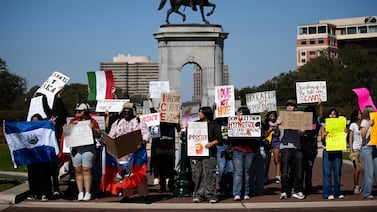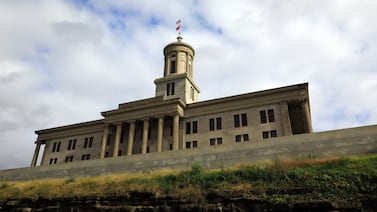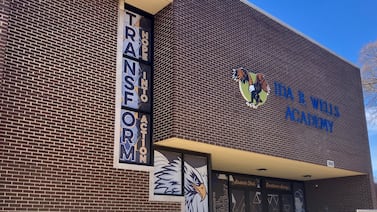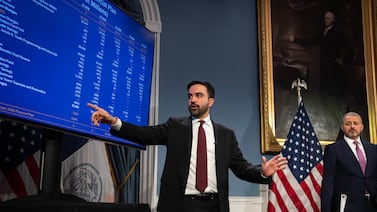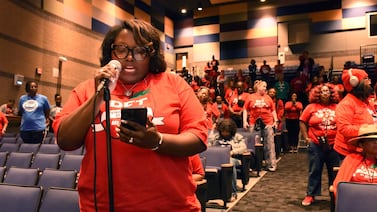Philadelphia students return to school on Monday facing the abrupt closure of one charter school and continued teacher vacancies that will require some district officials to spend at least a few days covering classrooms.
However, district officials said Friday they have reached an agreement to avert a strike with 32BJ of the Service Employees International Union (SEIU), which represents bus drivers, custodians, cleaners and other maintenance workers. The union’s contract is due to expire at midnight on Aug. 31. The union authorized a strike vote last week.
Issues in the contract talks included salary, school safety conditions, and the training members receive to deal with potentially dangerous incidents in schools.
The workers had gotten support from city elected officials, including Councilmember Helen Gym, who said in a statement that it is “unconscionable that the members of SEIU 32BJ are being held down to the lowest wage standards in the city at a time when maintenance workers and building engineers are among the highest vacancy positions within the School District.”
The agreement will have to be approved by the Board of Education at its next meeting.
The last district staffing update at the regular August Board of Education meeting said about 70% of the building engineer jobs were filled.
Board decides fate of two ‘Renaissance’ charters
Meanwhile, the Philadelphia Board of Education held a hastily-scheduled special meeting Friday morning to adopt a plan for two charter schools, Daroff and Bluford, which used to be run by Universal Companies. Daroff will close immediately. Bluford will open a week late, on Sept. 6, and close at the end of the school year.
But hundreds of families expecting to attend Daroff have been left scrambling just days before school opens.
“If I’m a parent, I’m feeling the shock of this, this morning,” said board member Lisa Salley, who voted against the resolution.“This is a real-time crisis happening right now for a significant number of children.”
The two schools were among the first district schools turned over to charter organizations as part of the district’s Renaissance initiative, billed at the time as a strategy to dramatically improve student achievement.
But that improvement didn’t happen, and the board voted to revoke the two charters in 2015. Universal continued to operate the schools while appealing the board’s decision to the state. When the state upheld the revocation in July, Universal stopped operating the two schools, but their independent boards continued to try to run them.
In recommending the action, Biridiana Rodriguez of the district’s Charter Schools Office said that the schools have struggled to hire staff. At last count, Daroff had 25 vacancies and Bluford 17.
She said the charter school office has been working with families to “identify a solution and provide the least amount of disruption.” As Renaissance charters, the schools had catchment areas, meaning that for more than a thousand students, they were the assigned neighborhood schools.
She and district Chief of Staff Alicia Prince said students assigned to Bluford can enroll there if they want, and Daroff students can enroll in Bluford. But affected students in both schools were also given the option to enroll in nearby district schools, and officials were also assisting them in finding other charters that might have room.
District officials said they will be at the Haverford Avenue public library branch all weekend to aid parents with enrolling their children. Parents can also enroll their children online.
After Friday’s meeting, board President Joyce Wilkerson said that the “legal process” dictated the last-minute nature of the decision-making around the schools. Overall, she added, “It’s hard to defend the Renaissance program as a success.”
Superintendent Tony Watlington, who became the district’s top official in June, said he is “still in a learning phase” about Pennsylvania charter law and the Renaissance program in particular.
In public comments, members of the watchdog group Alliance for Philadelphia Public Schools pointed out that Universal was paid more than $700,000 in “management fees” for operating the schools while its CEO was paid a $246,000 salary as recently as 2019.
“Renaissance Schools has turned out to be a massive and expensive failure and the board knows this,” APPS member Diane Payne testified.
Two other Renaissance charters, Olney High School and Stetson Middle School, once operated by the nonprofit organization ASPIRA, Inc., will open next week under district control after a yearlong transition process. Wilkerson said that Bluford and Daroff will return to district control after this year.
Watlington hopes for 100% staffing, prepares for less
Speaking about staff vacancies in the district, Jerry Jordan, president of the Philadelphia Federation of Teachers, said that the vacancy situation is “worse than any year I’ve experienced.”
Watlington and the district’s chief of talent, Larissa Shambaugh, say that teacher positions are 97.4% filled, which still leaves open some 200 jobs – meaning that as many as 6,000 students may be without a permanent teacher on the first day of school.
What 97% staffing means, Jordan said, is that in a middle or high school, where teachers may teach five classes of English or social studies or science or math, “one teacher is touching 150 students a day. The percentages don’t give me a clear picture of what staffing looks like in a school.”
In an interview at the ceremonial “ring the bell for PHL” event held Wednesday at Citizens Bank Park, Watlington said that he hoped that staffing for teachers and counselors would reach 100% by the first day of school. But if needed, he said, other district workers who have the proper credentials will be enlisted to work in classrooms.
He also noted that the district has installed air conditioners in 450 additional classrooms over the summer. The district is being “good stewards” of the resources available, he said.
Jordan and several teachers said that, despite all these issues, they were looking forward to the most “normal” school year since the pandemic began. Since that time, students and teachers have spent more than one entire school year online.
“I think the biggest challenge this year is just getting kids back to normal,” said Dan Fitzsimmons, a sixth grade teacher at Cramp Elementary School.
Gemayel Keyes will be making the transition from being a paraprofessional at Spruance Elementary School in the Northeast to being a teacher resident, Keyes will be co-teaching a fourth grade class for a year before getting his own classroom.
“I’m looking forward to having a school year where not only am I a teacher, but a student also, learning from the team of teachers I’m surrounded by so we can work together for the kids’ betterment,” he said.
As for his thoughts about Watlington as the district’s new leader, “I think he has good intentions, I will wait to see what he does,” Keyes said.
This story has been updated to reflect the status of an agreement between the Philadelphia district and the union for support staff that would avert a strike.
Dale Mezzacappa is a senior writer for Chalkbeat Philadelphia, where she covers K-12 schools and early childhood education in Philadelphia. Contact Dale at dmezzacappa@chalkbeat.org.


